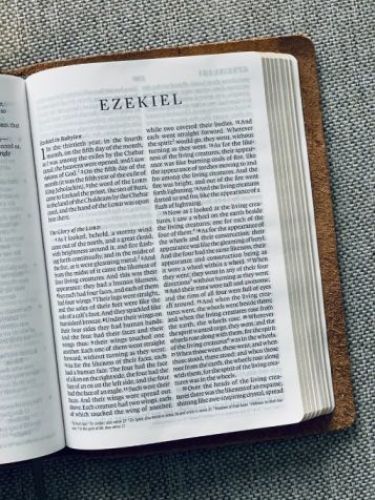
Jewish academic and Hebrew scholar Irene Lancaster on what lessons her community are learning from the Scripture readings that come straight after Pesach (Passover).
In the last three weeks we have celebrated the freedom festival of Pesach. We have also commemorated two more contemporary dates in the Jewish calendar: Holocaust Memorial Day and Memorial Day for Fallen Soldiers and Victims of Terrorism. The latest such event took place on the third contemporary Jewish festival, Yom Atzmaut – Israel Independence Day.
As the Jewish State enters her 75th year of existence, we continue to count the Omer on a daily basis for 49 days, culminating in the festival of Shavuot, the giving of the Torah on Sinai.
During this time we study the sedras relating to the definition of the term 'holy' in Judaism. These injunctions are given first of all to the people at large, and then specifically to the Kohanim, those people appointed to be priests in the Temple.
It is no coincidence that the people come before the priests in the hierarchy. Without an educated, disciplined and G-d-fearing populace, the priests risk insularity and even corruption (as we see for instance in present-day Russia!).
Today there are no 'priests' as such in Judaism - the aim is to turn the Jewish people into a 'community of priests'.
This week's Sedra, Emor (Leviticus 21-24), describes the ways in which the festivals are to be observed, beginning with Pesach, which we celebrated this year in the middle of April. From the second day of Pesach we started counting the Omer, which is mentioned in Leviticus 23: 9-14. The phrasing is rather curious and has given rise to overly-literal interpretations by those who do not adhere to rabbinic teaching, known as 'Jewish Oral Torah.' For observant Jews the Oral Torah comes to clarify the Biblical text, known as 'Written Torah'.
The question is, when exactly does counting the Omer start? The phrase used in Leviticus 23, verses 11 and 15, is 'on the day after the Shabbat'. But, what exactly is the meaning of 'Shabbat'? As we all know, Shabbat is 'the day of rest'. And the rabbis make it clear here that a festival (not necessarily falling on the seventh day of the week) is also to be considered a 'rest day'. Therefore, on the day after the first day of Pesach, we should start counting the Omer, whatever day of the week it happens to fall.
What is more, in verse 15 it also states: 'And you will count for yourselves from the day after the 'rest day' 7 full weeks.' This means that each individual Jew should count the Omer for him or herself every day, and not rely on others to do this for them.
'Counting the Omer' has thus become an immensely significant and spiritual time of year for the individual Jew. And, for the last 74 years of Israel's existence, such counting has also encompassed the three new festivals commemorating the Shoah (when two thirds of the Jews of Europe were wiped out); the ongoing slaughter of soldiers and noncombatants through terrorism; and political and religious independence once again after nearly 2000 years.
So, we find at least two suggestions here that it is the individual and their personal behavior that counts: first, by defining individual behavior, such as loving one's neighbor, plus the onus on every individual to count the Omer daily for 49 days, until the Festival of Shavuot is reached.
And in order to bring home the magnitude of the ultimate importance placed on individual every-day behaviour, the Haftorah readings, taken from the Prophets, complement and amplify what the Book of Leviticus is telling us.
Throughout May, we have readings from the prophetic books of Amos and Ezekiel.
Amos (9:7-15) chastises the Northern Kingdom of Israel for persecuting the poor and helpless, while indulging in luxuries. Amos tells the people that they were brought out of Egypt for a purpose. This purpose is to live a life different from that of the surrounding pagan peoples. However, the people are in fact simply behaving like the adjacent populations, instead of according to G-d's precepts. But it isn't too late to alter one's behavior, and when this happens the David kingdom will be restored.
Ezekiel (22:1-16) contrasts the way the Jewish people should conduct themselves with the gross behaviour to which they have in practice succumbed. The Torah teaches us that Israel must never take its holiness for granted, and here Ezekiel offers a very sharp critique of the people. However, there is a ray of hope – it is never too late to turn around and listen to the voice of G-d, and then the Jewish people will once again thrive in their own Land.
Finally, Ezekiel (44: 15-31) looks into the Messianic future and describes the laws that will apply to the Kohanim at that time, after the construction of the Third Temple, when a heightened level of spirituality will be attained by all.
So, what do we learn from the teachings encountered on the days and weeks that come straight after the festival of Pesach?
There is no doubt that the Book of Leviticus sets out in detail how each of us is meant to behave, both as individuals and as a community. The onus is on the individual. However, when we do backslide, although we will suffer for this and sometimes over a very long period (the present Exile having lasted for nearly 2000 years), we will nevertheless, eventually, come to see the light and change our ways. And this change will usher in the Messianic Age, with the restoration of the covenant with G-d and even greater hope for the life to come.
So, though Amos and Ezekiel appear to be prophets of doom, in fact, they are fundamentally prophets of hope – hope in the future, the future encapsulated so often in recent days, as we have been commemorating so much in our history.
The hope expressed in all the readings at this time of year is expressed in a song sung by Jews everywhere, whether in Israel or outside (including this year at Auschwitz), to express our hope for the future when we will, once again, be living in our own Land! This song is called 'Ha-Tikvah ('The Hope') and can be listened to here.
Republished from Christian Today UK.




